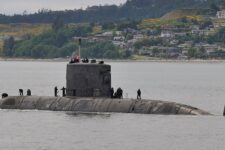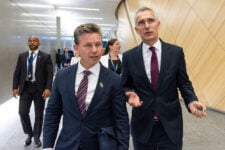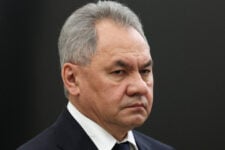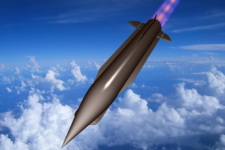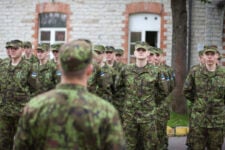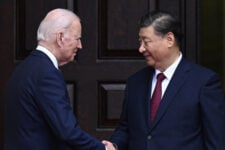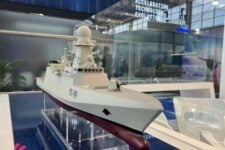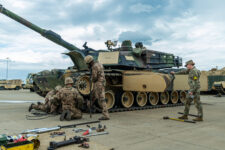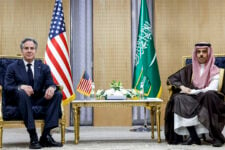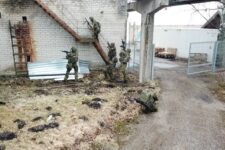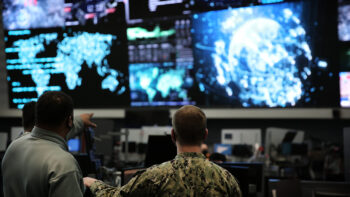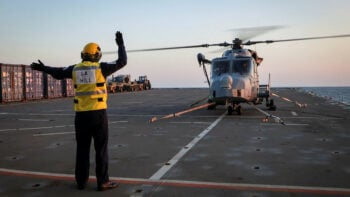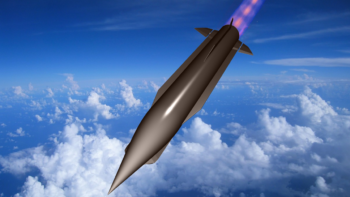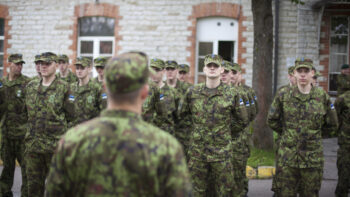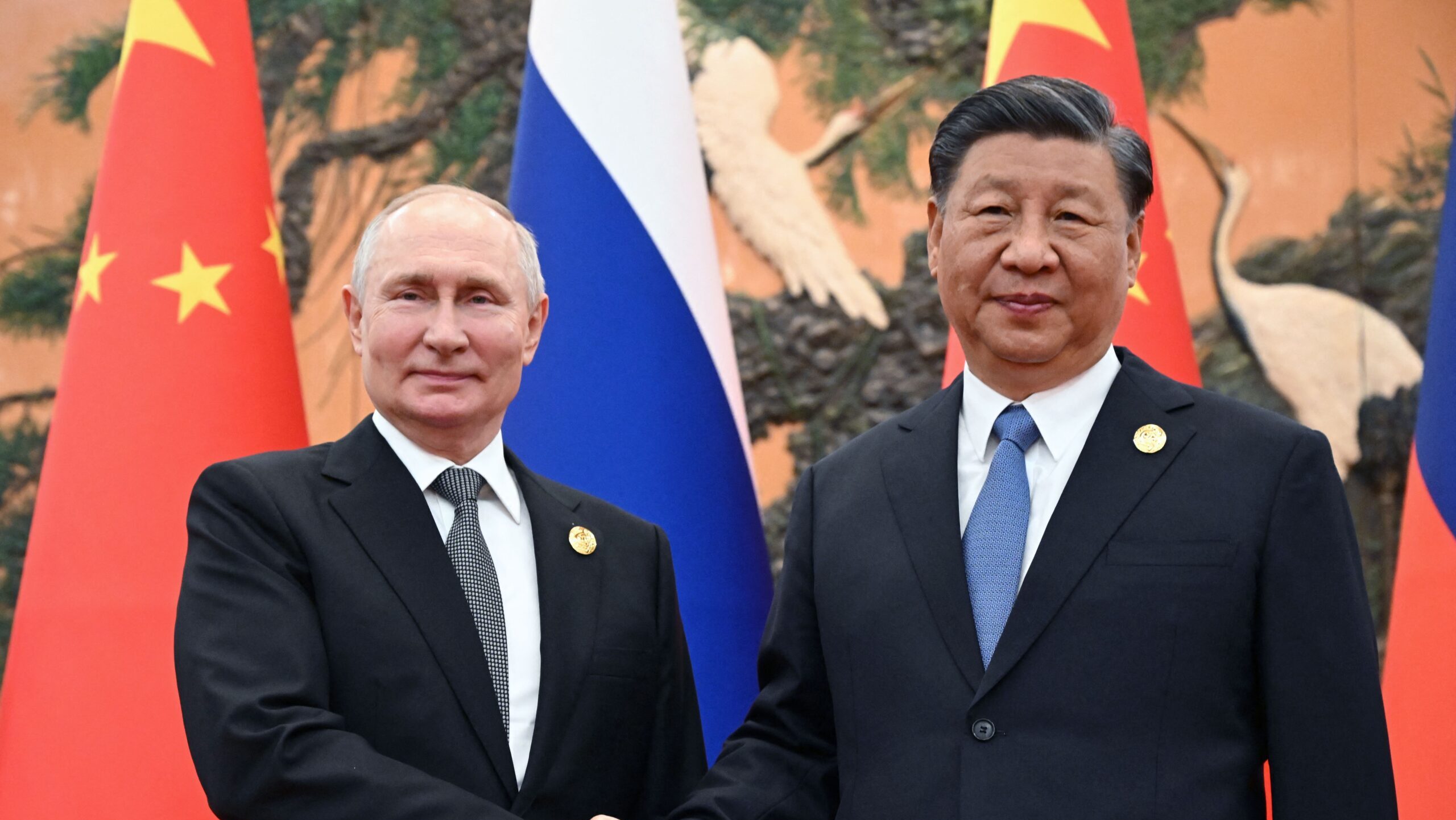
This pool photograph distributed by Russian state owned agency Sputnik shows Russia’s President Vladimir Putin and Chinese President Xi Jinping shaking hands during a meeting in Beijing on October 18, 2023. (Photo by SERGEI GUNEYEV/POOL/AFP via Getty Images)
FT. LAUDERDALE, Fla. — In an April 11 Economist article, a Peking University senior researcher predicted that Russia will ultimately suffer complete defeat in its war with Ukraine. Calling Russia’s failure “inevitable,” he projected Moscow’s forces “will be forced to withdraw from all occupied Ukrainian territories, including Crimea.”
In many ways, the comments from Professor Feng Yujun are anodyne, in line with what researchers from any NATO nation’s think tank might come up with. But the sourcing has raised eyebrows among China watchers, as Peking University’s School of International Studies has historically served as an unofficial channel bridging the gap between official public policy and the unspoken opinions of those in the background who seek to change that present-day policy.
Breaking Defense spoke to five current and former NATO nation diplomats and intelligence officers, including former defense attaches, who were all assigned to their embassies in Beijing at one point during Chinese President Xi Jinping’s rule and are familiar with the university, on how they interpreted Feng’s article appearing in a high-profile international publication.
China watchers are asking whether Feng’s article is a step in the evolution of differences in Chinese and Russian positions — or is it an overt signal of internal Chinese Communist Party (CCP) debate over Beijing’s policy of supporting Putin’s war in Ukraine?
One intelligence official previously posted to Beijing told Breaking Defense of Feng’s article — published in a Western-facing, English-language publication no less — that it is very “un-Chinese to release something like this. It would have to be sanctioned at the highest level, which makes me think — could it be a rogue group, a fake or a bit of a ploy to shape things with Russia?”
“Terminology is everything in a CCP regime,” stated one of several NATO-nation intelligence officers who spoke to Breaking Defense. “Certain phrases, ‘labels’ and code words are used to telegraph a larger set of positions and policy objectives by using language based on historical precedents. When said phraseology is employed, it means there is a larger agenda at work we can only see a part of — all we can do is offer informed speculation based on our experience.”
The final question, they all say, is how powerful are the factions within the CCP that are unnerved about the course of the war with Ukraine and are advocating a more cost-benefit balanced relationship between the CCP and the Kremlin. Sowing doubts about Russia’s chances of victory are their best chance of prevailing in any internal Party debate over their future course with Putin’s regime.
No one expects China to abandon Russia anytime soon. But even a wavering of commitment or small drawback of Beijing’s dedication to Moscow could be beneficial to Kyiv and its supporters, at a time when the winter is thawing and combat operations are expected to begin in earnest.
Messaging Is Subtle, But Important
There have been subtle signs that Beijing isn’t thrilled with Moscow’s current planning. As Feng wrote in his article, there have been alterations in the Party’s state-controlled press statements describing the nature of the PRC-Russia axis.
An example is how the February 2022 invasion of Ukraine created before-and-after descriptions by the PRC of its ties with Russia. When Putin visited Beijing (prior to the invasion) for the opening of the 2022 Winter Olympics, he and Xi signed a pact in which the two pledged a “no limits” partnership.
But today’s official statements, points out Feng, now instead highlight more traditional ideals of “non-alignment, non-confrontation and non-targeting of third parties.” For all of the increasing belligerence inherent in the PRC’s stance towards the West and general — and the US in particular — there remains an adherence by Xi to a productive and non-confrontational stance vis-a-vis the US. The conclusion is he will not opt for a complete breakdown in dialogue with Washington as the cost of supporting Putin to the hilt.
In this vein, Feng references the recent visit to Beijing by Russian Foreign Minister Sergei Lavrov, one which he describes as being more of a “diplomatic effort by Russia to show it is not alone than a genuine love-in” between the two nations.
One of the main points of divergence for the two nations, the former officials told Breaking Defense, is that the PRC is increasingly unenthusiastic about this Russian nuclear saber-rattling, with its official spokespersons emphasizing restraint over gamesmanship.
In early March, PRC Foreign Ministry spokeswoman Mao Ning obliquely criticized Putin threatening his Russian nuclear forces are “in a state of full readiness.” Speaking to the Beijing press corps, she stated “China believes that all nuclear weapon states need to embrace the idea of common security and uphold global strategic balance and stability.”
Notably, in his Economist piece, Feng downplayed Russia’s nuclear threats. Moscow’s nuclear arsenal “is no guarantee of success,” writes Feng. “Didn’t a nuclear-armed America [ultimately] withdraw from Korea, Vietnam and Afghanistan” without ever using its atomic arsenal when conventional force failed, he reminds the reader.
The Impossible Disconnect
Under these circumstances the overtly rational approach for the PRC, concluded more than one of the intelligence officers Breaking Defense spoke to, would be for Beijing to discreetly distance itself from Moscow. If not, Xi risks being dragged into a direct conflict with the West that he is trying his best to avoid.
As Feng points out, the war has highlighted that “China and Russia are very different countries” with increasingly differing objectives in their foreign affairs. Hence the lack of any discussion about the two nations signing a formal alliance with one another.
“Russia is seeking to subvert the existing international and regional order by means of war,” he writes. “Whereas China wants to resolve disputes peacefully” and without exacerbating the already awkward conflict between the world’s largest communist dictatorship and the democratic West. All of which dictates Xi downgrading to something less than a “no limits” partnership.
But a main cause for Russia’s eventual defeat that Feng makes in his assessment is also a central obstacle to Beijing disconnecting from Moscow. Due partly to the considerable sums of money to be made, the PRC is becoming, as US Secretary of State Anthony Blinken stated at the April 2024 G-7 summit on the Isle of Capri, “the primary contributor” of needed inputs to Russia’s defense industrial base.
The Russian defense industrial sector was particularly hard hit during the 1990s and early 2000s when many second- and third-tier suppliers simply disappeared. By the time of the Ukraine invasion, the loss of these suppliers had made Moscow heavily dependent on imported western-made components — particularly electronic systems — for production of its major weapon systems.
China's enablement of Russia's defence industry is stark: https://t.co/L6TSaThx1i
— Shashank Joshi (@shashj) April 29, 2024
This created a significant vulnerability to the sanctions subsequently imposed on Russia by the White House and Brussels that were primarily intended to cut off the importation of these components, as well as a wide range of other technologies from ball bearings to electrical transformers.
Singled out for particular attention were high-priority dual-use items such as integrated circuits and radio frequency transceiver modules with “extensive commercial applications but have also been found in Russian missiles and drones on the battlefield in Ukraine.” At their core these sanctions were designed to reverse Moscow’s ability to maintain defense production lines, and to impair the ability “to compete in a high-tech 21st-century economy,” read the US Administration’s announcement at their enactment.
At least the situation should have made Moscow vulnerable. But in 2022, as these sanctions blocked purchases of thousands of manufacturing components used in Russian weapons production, the PRC stepped into the breach.
Beijing becoming Moscow’s quartermaster has become a source of increasing concern for Washington. As Blinken declared on April 19 at the post G-7 summit press conference, “we see China sharing machine tools, semiconductors, other dual use items that have helped Russia rebuild the defense industrial base.
“China can’t have it both ways,” he continued. “It can’t afford that. You want to have positive, friendly relations with countries in Europe, and at the same time, you are fueling the biggest threat to European security since the end of the Cold War.”
But the dependency of Russian defense sector on the PRC is now almost complete, according to US intelligence community assessments. On April 12, and on condition of anonymity, senior US administration officials spoke to numerous press outlets, stating that even by 2023 some 90 percent of the microelectronics used in Russian missile, tank and aircraft production came from the PRC. The same officials revealed that 70 percent of Russia’s approximately $900 million in machine tool imports in the fourth quarter of 2023 were also sourced from Beijing.
The PRC has also been one of several nations assisting Russia with shortages of nitrocellulose, the key ingredient in gunpowder production. At almost every juncture the PRC has enabled Russia’s defense sector to pump up new production.
Consequently, wrote Alexander Gabuev in Foreign Affairs, “China and Russia are more firmly aligned now than at any time since the 1950s” with the union of the two facilitating continued production of Russian weapon systems.
But Beijing receives more than just money from its defense trade with Russia, said Gabuev, a senior scholar at the Carnegie Russia Eurasia Center in Berlin. “Russia also has some advanced military technologies that China still needs, despite the overall superior sophistication of Chinese defence manufacturing.”
These systems “include S-500 surface-to-air missiles, engines for modern fighter jets, tools for nuclear deterrence such as early-warning systems, stealthier submarines, and technologies for underwater warfare. Despite an exodus of talent following the invasion of Ukraine, Russia still has some brainpower, particularly in information technology, that China is interested in tapping.”
This puts the PRC into a precarious position. Stick with supporting Russia long enough in this war and some of the proverbial keys to the kingdom of military technology Beijing has been trying to get its hands on for more than a decade will be theirs for the picking.
However, maintaining a closer defense industrial partnership also puts Xi and the CCP at more than just the risk of being sanctioned by Washington. They could also suffer the humiliation of being the senior partner in an — albeit informal — wartime union with Russia that will end in the latter’s defeat.
It is a delicate balancing act that will become increasingly difficult to sustain as Ukraine acquires more advanced western weaponry and Russia in turn demands increasingly more from its Chinese partner to compensate.


